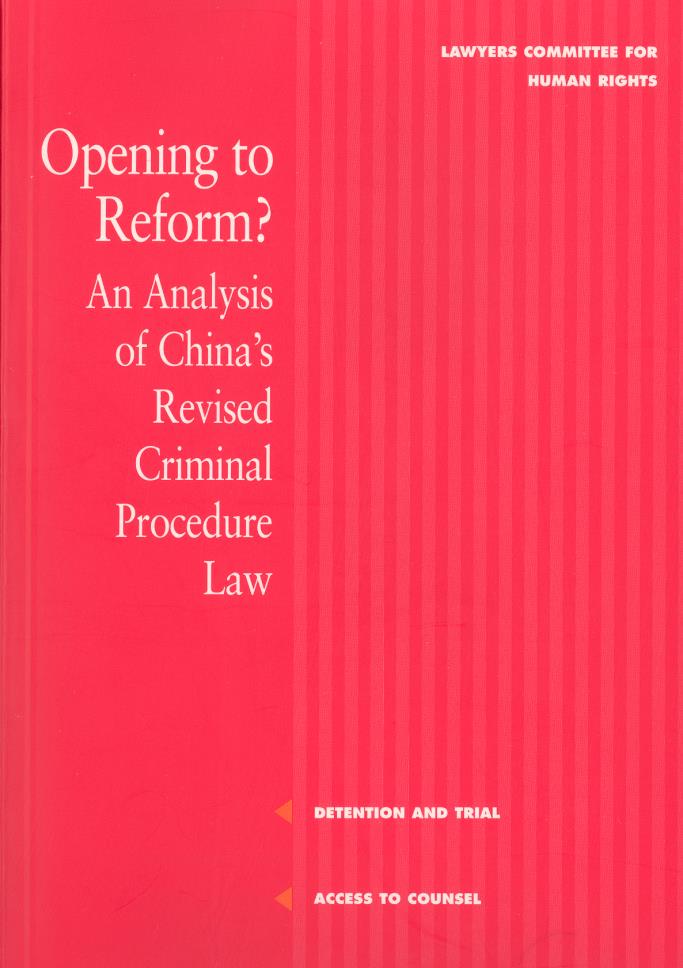
LAWYERS COMMITTEE FOR HUMAN RIGHTS Opening to Reform? An Analysis of China's Revised Criminal Procedure Law DETENTION AND TRIAL ACCESS TO COUNSEL
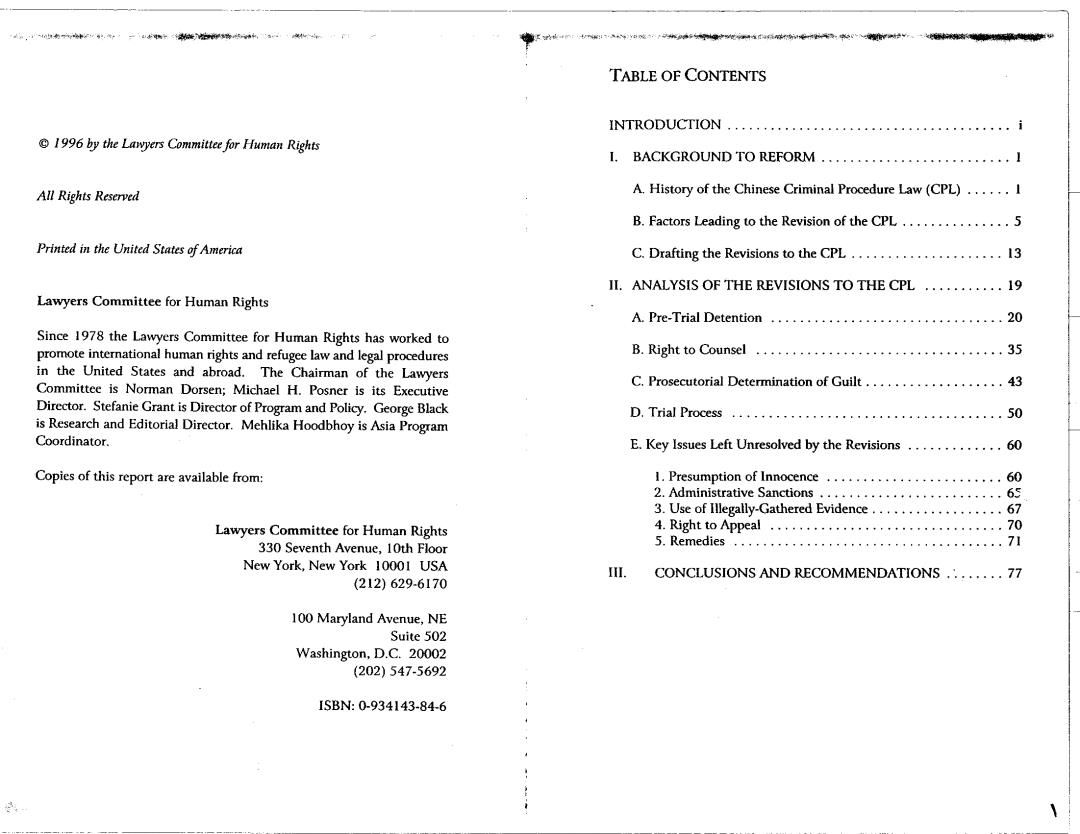
TABLE OF CONTENTS INTRODUCTION.…i 1996 by the Lawyers Committee for Human Rights L.BACKGROUND TO REFORM...····1 All Rights Reserved A.History of the Chinese Criminal Procedure Law(CPL)......I B.Factors Leading to the Revision of the CPL...............5 Printed in the United States of America C.Drafting the Revisions to the CPL.....................13 II.ANALYSIS OF THE REVISIONS TO THE CPL...........19 Lawyers Committee for Human Rights A.Pre-Trial Detention................................20 Since 1978 the Lawyers Committee for Human Rights has worked to promote international human rights and refugee law and legal procedures B.Right to Counsel ................. 35 in the United States and abroad.The Chairman of the Lawyers Committee is Norman Dorsen;Michael H.Posner is its Executive C.Prosecutorial Determination of Guilt................... 43 Director.Stefanie Grant is Director of Program and Policy.George Black is Research and Editorial Director.Mehlika Hoodbhoy is Asia Program D.Trial Process .....................................50 Coordinator. E.Key Issues Left Unresolved by the Revisions .............60 Copies of this report are available from: 1.Presumption of Innocence........................60 2.Administrative Sanctions.........................65 3.Use of Illegally-Gathered Evidence..................67 Lawyers Committee for Human Rights 4.Right to Appeal................................70 330 Seventh Avenue,10th Floor 5.Remedies...........7l New York,New York 10001 USA III. (212)629-6I70 CONCLUSIONS AND RECOMMENDATIONS........77 100 Maryland Avenue,NE Suite 502 Washington,D.C.20002 (202)547-5692 ISBN:0-934143-84-6
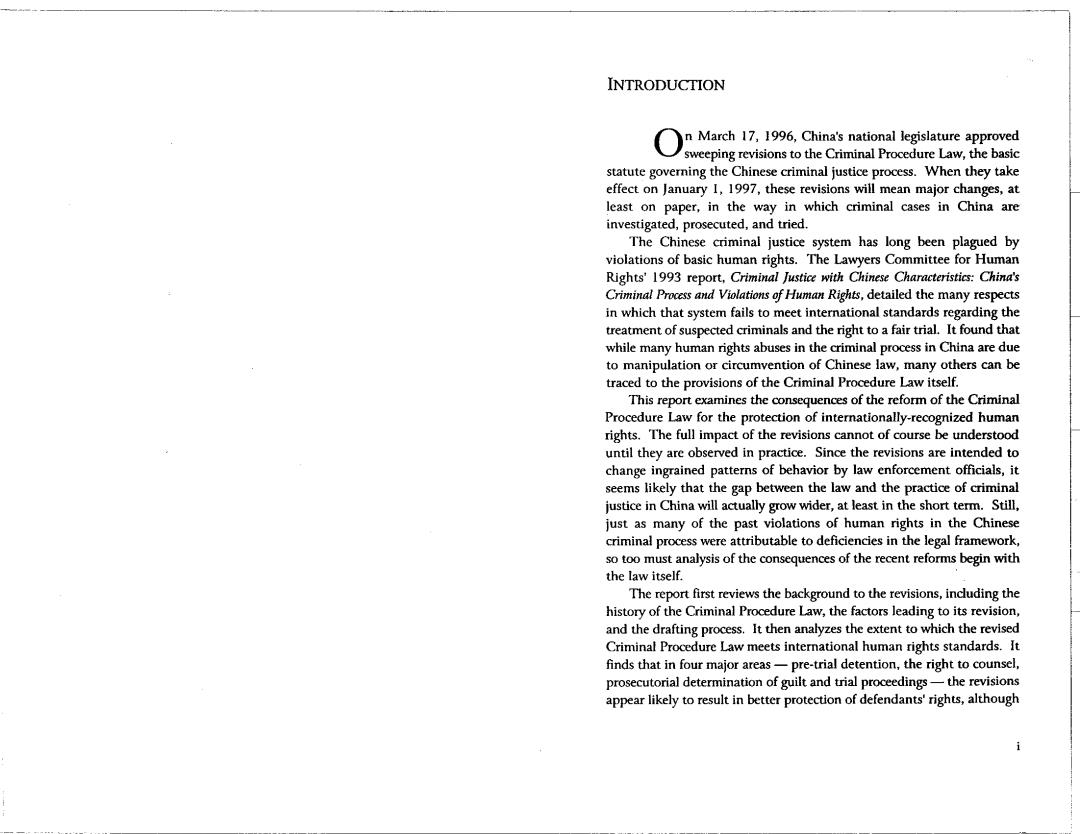
INTRODUCTION March 17 Chins naional esture proved sweeping revisions to the Criminal Procedure Law,the basic statute governing the Chinese criminal justice process.When they take effect on January 1,1997,these revisions will mean major changes,at least on paper,in the way in which criminal cases in China are investigated,prosecuted,and tried. The Chinese criminal justice system has long been plagued by violations of basic human rights.The Lawyers Committee for Human Rights'1993 report,Criminal Justice with Chinese Characteristics:China's Criminal Process and Violations of Human Rights,detailed the many respects in which that system fails to meet international standards regarding the treatment of suspected criminals and the right to a fair trial.It found that while many human rights abuses in the criminal process in China are due to manipulation or circumvention of Chinese law,many others can be traced to the provisions of the Criminal Procedure Law itself. This report examines the consequences of the reform of the Criminal Procedure Law for the protection of internationally-recognized human rights.The full impact of the revisions cannot of course be understood until they are observed in practice.Since the revisions are intended to change ingrained patterns of behavior by law enforcement officials,it seems likely that the gap between the law and the practice of criminal justice in China will actually grow wider,at least in the short term.Still, just as many of the past violations of human rights in the Chinese criminal process were attributable to deficiencies in the legal framework, so too must analysis of the consequences of the recent reforms begin with the law itself. The report first reviews the background to the revisions,including the history of the Criminal Procedure Law,the factors leading to its revision, and the drafting process.It then analyzes the extent to which the revised Criminal Procedure Law meets international human rights standards.It finds that in four major areas-pre-trial detention,the right to counsel, prosecutorial determination of guilt and trial proceedings-the revisions appear likely to result in better protection of defendants'rights,although
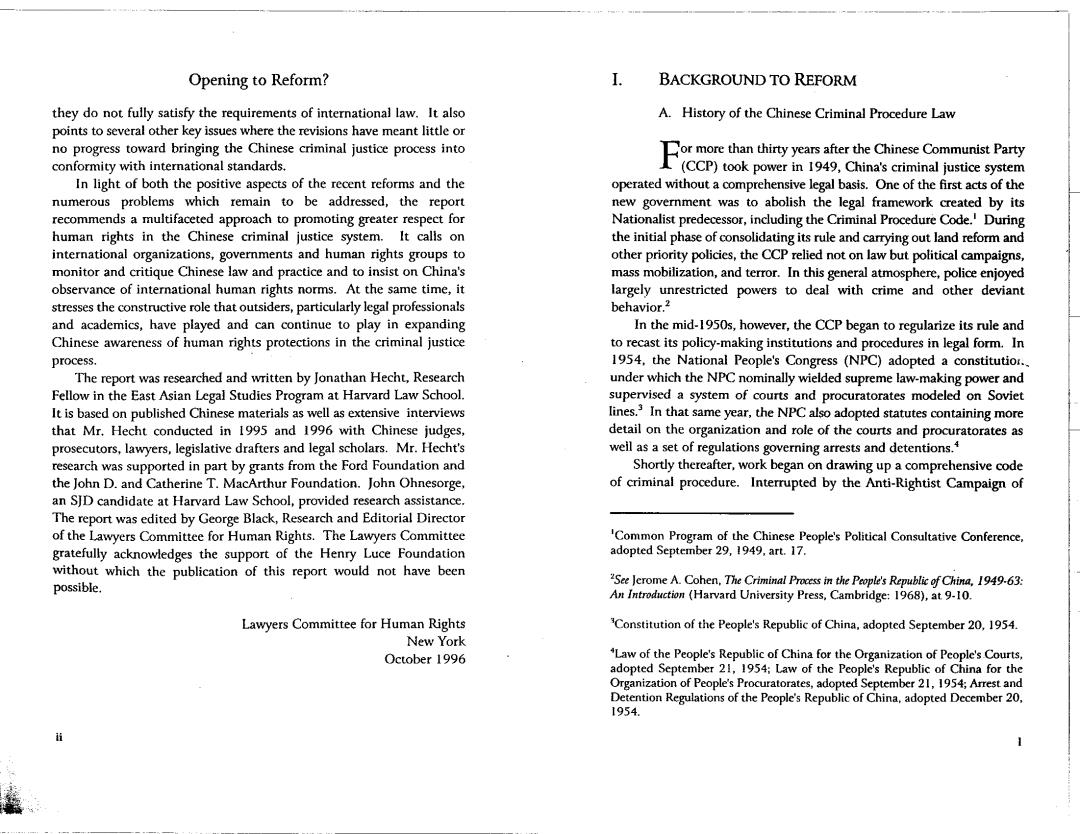
Opening to Reform? I. BACKGROUND TO REFORM they do not fully satisfy the requirements of international law.It also A.History of the Chinese Criminal Procedure Law points to several other key issues where the revisions have meant little or no progress toward bringing the Chinese criminal justice process into or more than thirty years after the Chinese Communist Party conformity with international standards. (CCP)took power in 1949,China's criminal justice system In light of both the positive aspects of the recent reforms and the operated without a comprehensive legal basis.One of the first acts of the numerous problems which remain to be addressed,the report new government was to abolish the legal framework created by its recommends a multifaceted approach to promoting greater respect for Nationalist predecessor,including the Criminal Procedure Code.'During human rights in the Chinese criminal justice system.It calls on the initial phase of consolidating its rule and carrying out land reform and international organizations,governments and human rights groups to other priority policies,the CCP relied not on law but political campaigns, monitor and critique Chinese law and practice and to insist on China's mass mobilization,and terror.In this general atmosphere,police enjoyed observance of international human rights norms.At the same time,it largely unrestricted powers to deal with crime and other deviant stresses the constructive role that outsiders,particularly legal professionals behavior. and academics,have played and can continue to play in expanding In the mid-1950s,however,the CCP began to regularize its rule and Chinese awareness of human rights protections in the criminal justice to recast its policy-making institutions and procedures in legal form.In process. 1954.the National People's Congress (NPC)adopted a constitutior.. The report was researched and written by Jonathan Hecht,Research under which the NPC nominally wielded supreme law-making power and Fellow in the East Asian Legal Studies Program at Harvard Law School. supervised a system of courts and procuratorates modeled on Soviet It is based on published Chinese materials as well as extensive interviews lines.In that same year,the NPC also adopted statutes containing more that Mr.Hecht conducted in 1995 and 1996 with Chinese judges, detail on the organization and role of the courts and procuratorates as prosecutors,lawyers,legislative drafters and legal scholars.Mr.Hecht's weil as a set of regulations governing arrests and detentions. research was supported in part by grants from the Ford Foundation and Shortly thereafter,work began on drawing up a comprehensive code the John D.and Catherine T.MacArthur Foundation.John Ohnesorge, of criminal procedure.Interrupted by the Anti-Rightist Campaign of an SJD candidate at Harvard Law School,provided research assistance. The report was edited by George Black,Research and Editorial Director of the Lawyers Committee for Human Rights.The Lawyers Committee Common Program of the Chinese People's Political Consultative Conference. gratefully acknowledges the support of the Henry Luce Foundation adopted September 29,1949.art.17. without which the publication of this report would not have been possible. See Jerome A.Cohen.The Criminal Process in the People's Republic of China,1949-63: An Introduction (Harvard University Press,Cambridge:1968),at 9-10. Lawyers Committee for Human Rights Constitution of the People's Republic of China.adopted September 20,1954. New York October 1996 Law of the People's Republic of China for the Organization of People's Courts, adopted September 21,1954;Law of the People's Republic of China for the Organization of People's Procuratorates,adopted September 21,1954;Arrest and Detention Regulations of the People's Republic of China,adopted December 20, 1954
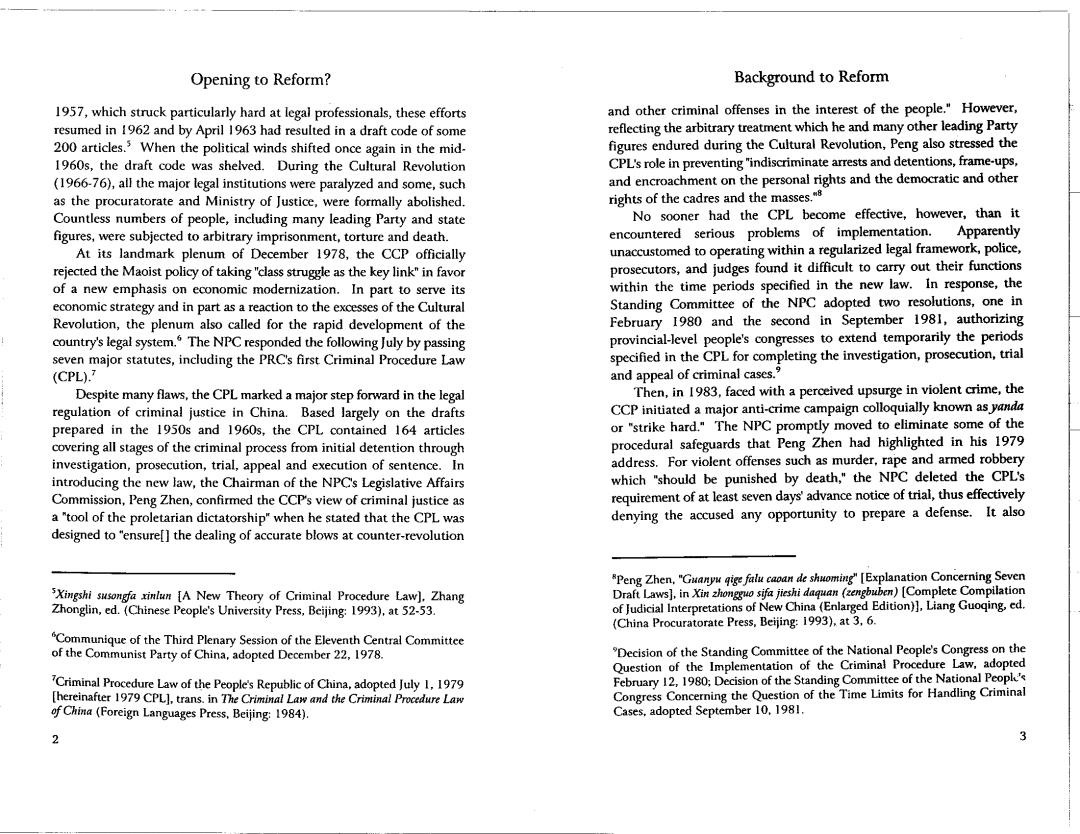
Opening to Reform? Background to Reform 1957,which struck particularly hard at legal professionals,these efforts and other criminal offenses in the interest of the people."However, resumed in 1962 and by April 1963 had resulted in a draft code of some reflecting the arbitrary treatment which he and many other leading Party 200 articles.3 When the political winds shifted once again in the mid- figures endured during the Cultural Revolution,Peng also stressed the 1960s,the draft code was shelved.During the Cultural Revolution CPL's role in preventing "indiscriminate arrests and detentions,frame-ups, (1966-76),all the major legal institutions were paralyzed and some,such and encroachment on the personal rights and the democratic and other as the procuratorate and Ministry of Justice,were formally abolished. rights of the cadres and the masses." Countless numbers of people,including many leading Party and state No sooner had the CPL become effective,however,than it figures,were subjected to arbitrary imprisonment,torture and death. encountered serious problems of implementation.Apparently At its landmark plenum of December 1978,the CCP officially unaccustomed to operating within a regularized legal framework,police, rejected the Maoist policy of taking"class struggle as the key link"in favor prosecutors,and judges found it difficult to carry out their functions of a new emphasis on economic modernization.In part to serve its within the time periods specified in the new law.In response,the economic strategy and in part as a reaction to the excesses of the Cultural Standing Committee of the NPC adopted two resolutions,one in Revolution,the plenum also called for the rapid development of the February 1980 and the second in September 1981,authorizing country's legal system.The NPC responded the following July by passing provincial-level people's congresses to extend temporarily the periods seven major statutes,including the PRC's first Criminal Procedure Law specified in the CPL for completing the investigation,prosecution,trial (CPL)." and appeal of criminal cases.? Despite many flaws,the CPL marked a major step forward in the legal Then,in 1983,faced with a perceived upsurge in violent crime,the regulation of criminal justice in China.Based largely on the drafts CCP initiated a major anti-crime campaign colloquially known as yanda prepared in the 1950s and 1960s,the CPL contained 164 articles or "strike hard."The NPC promptly moved to eliminate some of the covering all stages of the criminal process from initial detention through procedural safeguards that Peng Zhen had highlighted in his 1979 investigation,prosecution,trial,appeal and execution of sentence.In address.For violent offenses such as murder,rape and armed robbery introducing the new law,the Chairman of the NPC's Legislative Affairs which "should be punished by death,"the NPC deleted the CPL's Commission,Peng Zhen,confirmed the CCP's view of criminal justice as requirement of at least seven days'advance notice of trial,thus effectively a "tool of the proletarian dictatorship"when he stated that the CPL was denying the accused any opportunity to prepare a defense.It also designed to "ensure[]the dealing of accurate blows at counter-revolution Peng Zhen,"Guanyu qige falu caoan de shuoming"[Explanation Concerning Seven sXingshi susongfa rinlun [A New Theory of Criminal Procedure Law].Zhang Draft Laws],in Xin zhongguo sifa jieshi daquan (zengbuben)[Complete Compilation Zhonglin,ed.(Chinese People's University Press,Beijing:1993),at 52-53. of Judicial Interpretations of New China (Enlarged Edition)],Liang Guoqing,ed. (China Procuratorate Press,Beijing:1993),at 3,6. Communique of the Third Plenary Session of the Eleventh Central Committee of the Communist Party of China,adopted December 22,1978. Decision of the Standing Committee of the National People's Congress on the Question of the Implementation of the Criminal Procedure Law,adopted Criminal Procedure Law of the People's Republic of China,adopted July 1,1979 February 12,1980;Decision of the Standing Committee of the National Peopl's [hereinafter 1979 CPL].trans.in The Criminal Law and the Criminal Procedure Law Congress Concerning the Question of the Time Limits for Handling Criminal of China (Foreign Languages Press,Beijing:1984). Cases,adopted September 10.1981. 3
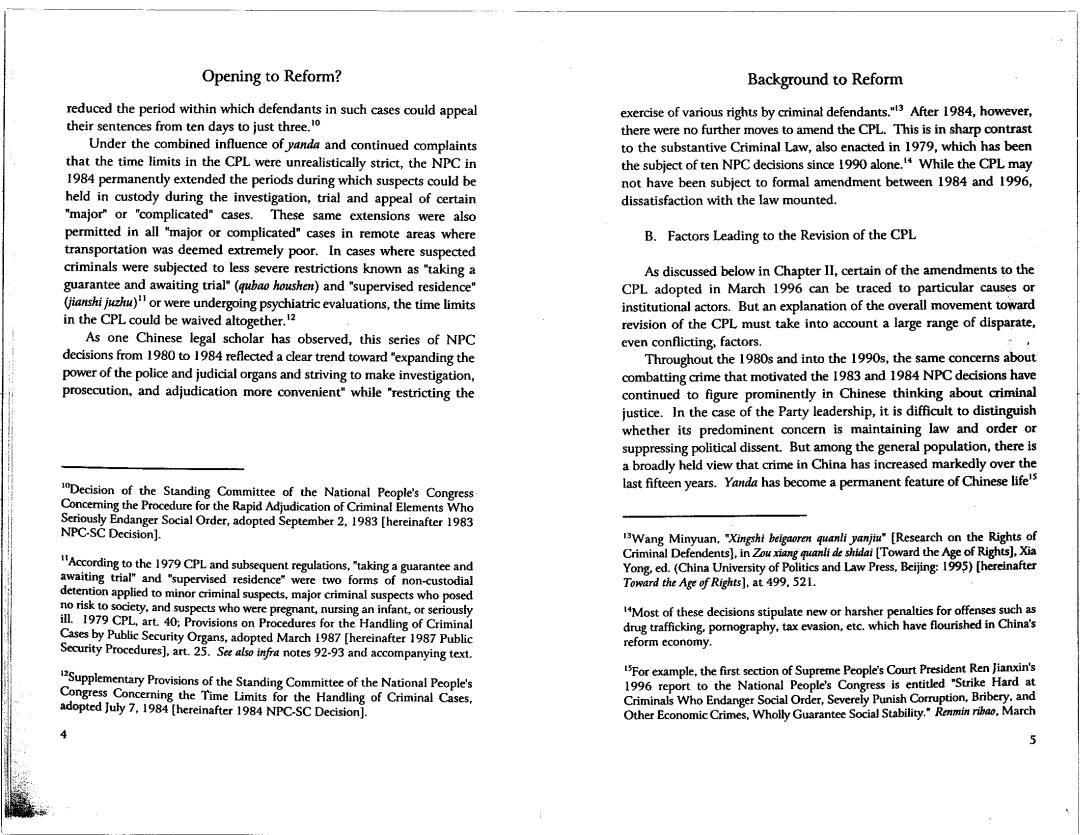
Opening to Reform? Background to Reform reduced the period within which defendants in such cases could appeal exercise of various rights by criminal defendants."3 After 1984,however, their sentences from ten days to just three.10 there were no further moves to amend the CPL.This is in sharp contrast Under the combined influence of yanda and continued complaints to the substantive Criminal Law,also enacted in 1979,which has been that the time limits in the CPL were unrealistically strict,the NPC in the subject of ten NPC decisions since 1990 alone.+While the CPL may 1984 permanently extended the periods during which suspects could be not have been subject to formal amendment between 1984 and 1996, held in custody during the investigation,trial and appeal of certain dissatisfaction with the law mounted. "major"or "complicated"cases.These same extensions were also permitted in all "major or complicated"cases in remote areas where B.Factors Leading to the Revision of the CPL transportation was deemed extremely poor.In cases where suspected criminals were subjected to less severe restrictions known as "taking a As discussed below in Chapter II,certain of the amendments to the guarantee and awaiting trial"(qubao houshen)and "supervised residence" CPL adopted in March 1996 can be traced to particular causes or (jianshi)or were undergoing psychiatric evaluations,the time limits institutional actors.But an explanation of the overall movement toward in the CPL could be waived altogether.2 revision of the CPL must take into account a large range of disparate, As one Chinese legal scholar has observed,this series of NPC even conflicting,factors. decisions from 1980 to 1984 reflected a clear trend toward "expanding the Throughout the 1980s and into the 1990s,the same concerns about power of the police and judicial organs and striving to make investigation, combatting crime that motivated the 1983 and 1984 NPC decisions have prosecution,and adjudication more convenient"while "restricting the continued to figure prominently in Chinese thinking about criminal justice.In the case of the Party leadership,it is difficult to distinguish whether its predominent concern is maintaining law and order or suppressing political dissent.But among the general population,there is a broadly held view that crime in China has increased markedly over the Decision of the Standing Committee of the National People's Congress last fifteen years.Yanda has become a permanent feature of Chinese life's Concerning the Procedure for the Rapid Adjudication of Criminal Elements Who Seriously Endanger Social Order,adopted September 2,1983 [hereinafter 1983 NPC-SC Decision]. Wang Minyuan."Xingshi beigaoren quanli yanjiu"[Research on the Rights of According to the 1979CPLand subsequent regulations."takinga guarantee and Criminal Defendents),in Zou xiang qanli de shidai [Toward the Age of Rights],Xia Yong,ed.(China University of Politics and Law Press,Beijing:1995)[hereinafter awaiting trial"and "supervised residence"were two forms of non-custodial detention applied to minor criminal suspects,major criminal suspects who posed Toward the Age of Rights].at 499.521. no risk to society,and suspects who were pregnant,nursing an infant,or seriously ill.1979 CPL.art.40:Provisions on Procedures for the Handling of Criminal Most of these decisions stipulate new or harsher penalties for offenses such as Cases by Public Security Organs,adopted March 1987 [hereinafter 1987 Public drug trafficking,pornography,tax evasion,etc.which have flourished in China's Security Procedures],art.25.See also infra notes 92-93 and accompanying text. reform economy. Supplementary Provisions of the Standing Committee of the National People's For example,the first section of Supreme People's Court President Ren Jianxin's Congress Concerning the Time Limits for the Handling of Criminal Cases. 1996 report to the National People's Congress is entitled"Strike Hard at adopted July 7,1984 [hereinafter 1984 NPC-SC Decision]. Criminals Who Endanger Social Order,Severely Punish Corruption,Bribery,and Other Economic Crimes,Wholly Guarantee Social Stability."Renmin ribao,March 5
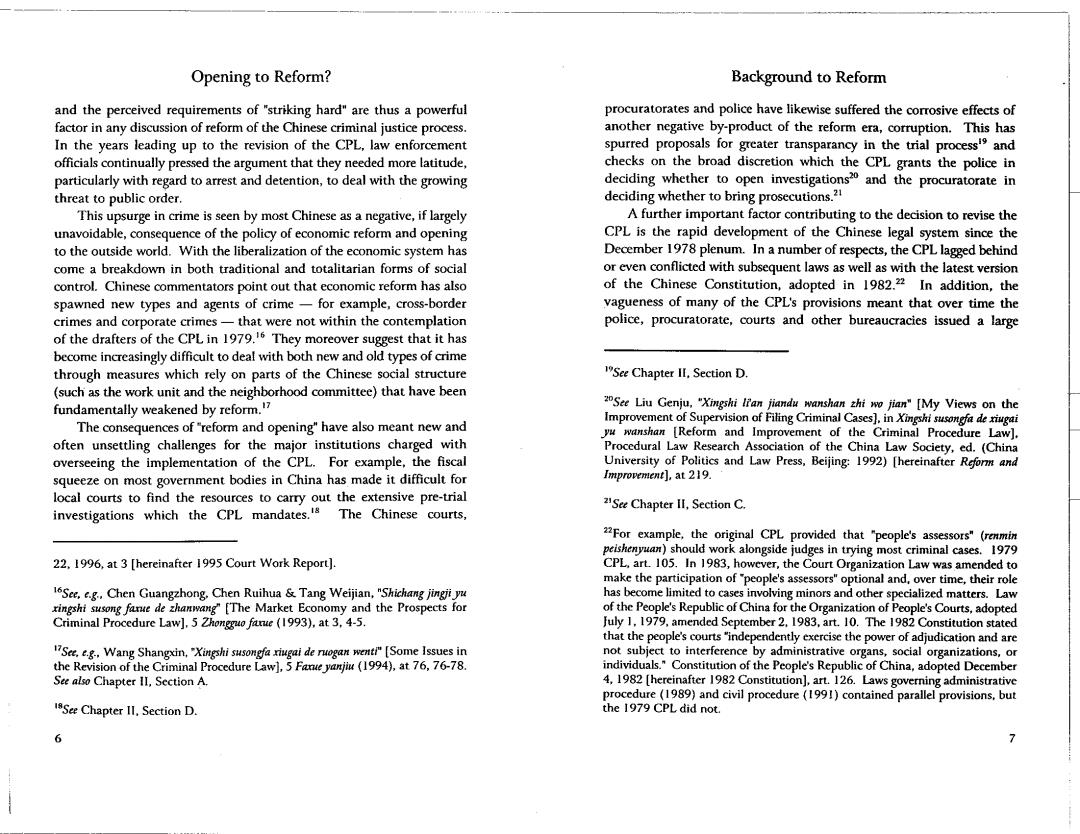
Opening to Reform? Background to Reform and the perceived requirements of "striking hard"are thus a powerful procuratorates and police have likewise suffered the corrosive effects of factor in any discussion of reform of the Chinese criminal justice process. another negative by-product of the reform era,corruption.This has In the years leading up to the revision of the CPL,law enforcement spurred proposals for greater transparancy in the trial processs and officials continually pressed the argument that they needed more latitude, checks on the broad discretion which the CPL grants the police in particularly with regard to arrest and detention,to deal with the growing deciding whether to open investigations2 and the procuratorate in threat to public order. deciding whether to bring prosecutions.21 This upsurge in crime is seen by most Chinese as a negative,if largely A further important factor contributing to the decision to revise the unavoidable,consequence of the policy of economic reform and opening CPL is the rapid development of the Chinese legal system since the to the outside world.With the liberalization of the economic system has December 1978 plenum.In a number of respects,the CPL lagged behind come a breakdown in both traditional and totalitarian forms of social or even conflicted with subsequent laws as well as with the latest version control.Chinese commentators point out that economic reform has also of the Chinese Constitution,adopted in 1982.22 In addition,the spawned new types and agents of crime-for example,cross-border vagueness of many of the CPL's provisions meant that over time the crimes and corporate crimes-that were not within the contemplation police,procuratorate,courts and other bureaucracies issued a large of the drafters of the CPL in 1979.6 They moreover suggest that it has become increasingly difficult to deal with both new and old types of crime through measures which rely on parts of the Chinese social structure See Chapter II,Section D. (such as the work unit and the neighborhood committee)that have been fundamentally weakened by reform.7 2See Liu Genju."Xingshi lian jiandu wanshan zhi wo jian"[My Views on the The consequences of'reform and opening"have also meant new and Improvement of Supervision of Filing Criminal Cases],in Xingshi susongfa de riugai yu wanshan [Reform and Improvement of the Criminal Procedure Law]. often unsettling challenges for the major institutions charged with Procedural Law Research Association of the China Law Society,ed.(China overseeing the implementation of the CPL.For example,the fiscal University of Politics and Law Press,Beijing:1992)[hereinafter Reform and squeeze on most government bodies in China has made it difficult for Improvement],at 219. local courts to find the resources to carry out the extensive pre-trial investigations which the CPL mandates.s The Chinese courts, 2See Chapter II,Section C. 2For example,the original CPL provided that "people's assessors"(renmin peishenyuan)should work alongside judges in trying most criminal cases.1979 22.1996,at 3 [hereinafter 1995 Court Work Report]. CPL.art.105.In 1983,however,the Court Organization Law was amended to make the participation of people's assessors"optional and,over time,their role See.g Chen Guangzhong.Chen Ruihua&Tang Weijian,"Shichang jingjiyu has become limited to cases involving minors and other specialized matters.Law ringshi susong farue de zhanwang"[The Market Economy and the Prospects for of the People's Republic of China for the Organization of People's Courts,adopted Criminal Procedure Law].5 Zhongguo farue(1993).at 3,4-5. July 1.1979,amended September 2.1983,art.10.The 1982 Constitution stated that the people's courts"independently exercise the power of adjudication and are Wang Shangdin.Xingshi susongfa riugai de rogan [Some Issues in not subject to interference by administrative organs,social organizations,or the Revision of the Criminal Procedure Law],5 Fane yanjiu (1994),at 76,76-78. individuals."Constitution of the People's Republic of China,adopted December See also Chapter II.Section A. 4,1982 [hereinafter 1982 Constitution],art.126.Laws governing administrative procedure (1989)and civil procedure (1991)contained parallel provisions,but See Chapter II.Section D. the 1979 CPL did not. 7
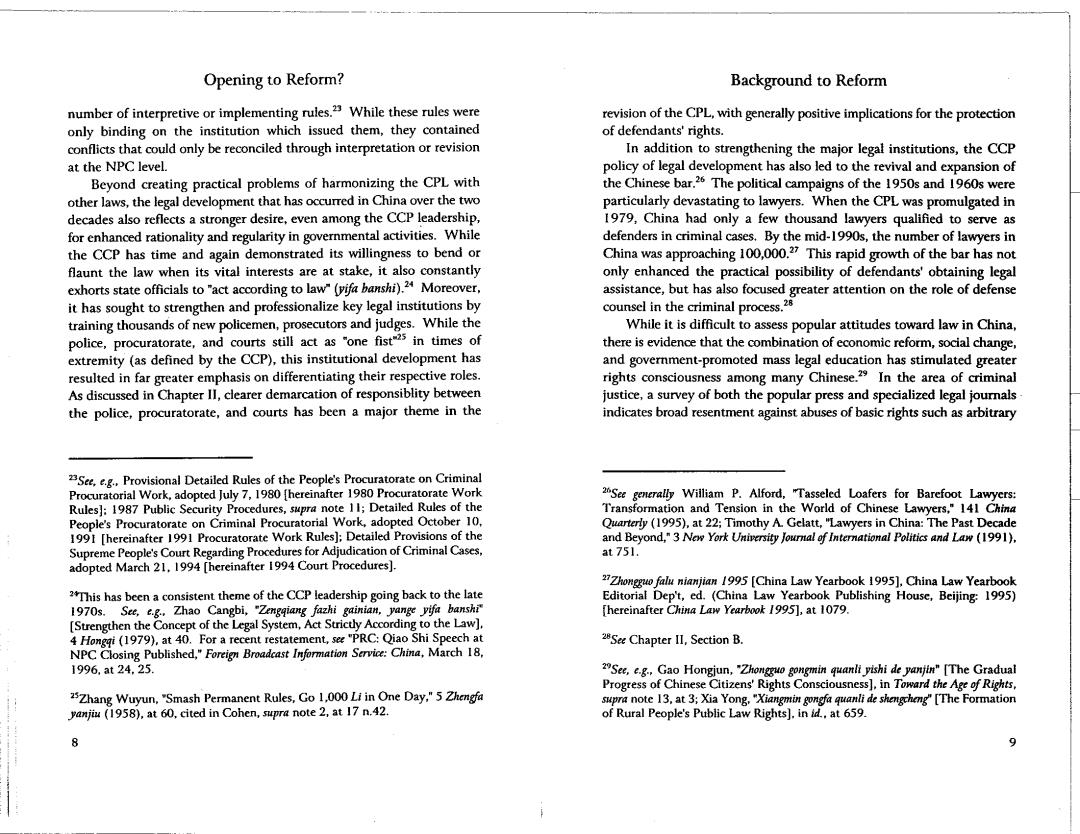
Opening to Reform? Background to Reform number of interpretive or implementing rules.2 While these rules were revision of the CPL,with generally positive implications for the protection only binding on the institution which issued them,they contained of defendants'rights. conflicts that could only be reconciled through interpretation or revision In addition to strengthening the major legal institutions,the CCP at the NPC level. policy of legal development has also led to the revival and expansion of Beyond creating practical problems of harmonizing the CPL with the Chinese bar.26 The political campaigns of the 1950s and 1960s were other laws,the legal development that has occurred in China over the two particularly devastating to lawyers.When the CPL was promulgated in decades also reflects a stronger desire,even among the CCP leadership, 1979,China had only a few thousand lawyers qualified to serve as for enhanced rationality and regularity in governmental activities.While defenders in criminal cases.By the mid-1990s,the number of lawyers in the CCP has time and again demonstrated its willingness to bend or China was approaching 100,000.27 This rapid growth of the bar has not flaunt the law when its vital interests are at stake,it also constantly only enhanced the practical possibility of defendants'obtaining legal exhorts state officials to"act according to law"(yifa banshi).24 Moreover, assistance,but has also focused greater attention on the role of defense it has sought to strengthen and professionalize key legal institutions by counsel in the criminal process.2 training thousands of new policemen,prosecutors and judges.While the While it is difficult to assess popular attitudes toward law in China, police,procuratorate,and courts still act as "one fist"25 in times of there is evidence that the combination of economic reform,social change, extremity (as defined by the CCP),this institutional development has and government-promoted mass legal education has stimulated greater resulted in far greater emphasis on differentiating their respective roles. rights consciousness among many Chinese.29 In the area of criminal As discussed in Chapter Il,clearer demarcation of responsiblity between justice,a survey of both the popular press and specialized legal journals the police,procuratorate,and courts has been a major theme in the indicates broad resentment against abuses of basic rights such as arbitrary Se.g.Provisional Detailed Rules of the People's Procuratorate on Criminal Procuratorial Work,adopted July 7,1980 [hereinafter 1980 Procuratorate Work 2See generally William P.Alford,"Tasseled Loafers for Barefoot Lawyers: Rules]:1987 Public Security Procedures,supra note 11;Detailed Rules of the Transformation and Tension in the World of Chinese Lawyers,"141 China People's Procuratorate on Criminal Procuratorial Work,adopted October 10. Quarteriy (1995),at 22;Timothy A.Gelatt,"Lawyers in China:The Past Decade 1991 [hereinafter 1991 Procuratorate Work Rules]:Detailed Provisions of the and Beyond,"3 New York University Journal of International Politics and Law (1991). Supreme People's Court Regarding Procedures for Adjudication of Criminal Cases, at751. adopted March 21,1994 [hereinafter 1994 Court Procedures]. 27Zhongguo falu nianjian 1995 [China Law Yearbook 1995].China Law Yearbook 2This has been a consistent theme of the CCP leadership going back to the late Editorial Dep't,ed.(China Law Yearbook Publishing House,Beijing:1995) 1970s.See,6.g..Zhao Cangbi,"Zengqiang fazhi gainian,yange yifa banshi Thereinafter China Law Yearbook 1995],at 1079. [Strengthen the Concept of the Legal System,Act Strictly According to the Law]. 4 Hongqi (1979),at 40.For a recent restatement,see"PRC:Qiao Shi Speech at 2See Chapter II,Section B. NPC Closing Published,"Foreign Broadcast Information Service:China,March 18, 1996.at24.25. 2Se.Gao Hongjun.Zhongguo gongmin quanli yishi de yanjin"[The Gradual Progress of Chinese Citizens'Rights Consciousness],in Toward the Age of Rights, 25Zhang Wuyun,"Smash Permanent Rules,Go 1,000 Li in One Day,"5 Zhengfa supra note 13,at 3;Xia Yong,"Xiangmin gongfa quanli de shengcheng"[The Formation yanjiu (1958),at 60,cited in Cohen,supra note 2,at 17 n.42. of Rural People's Public Law Rights].in id.,at 659. 9
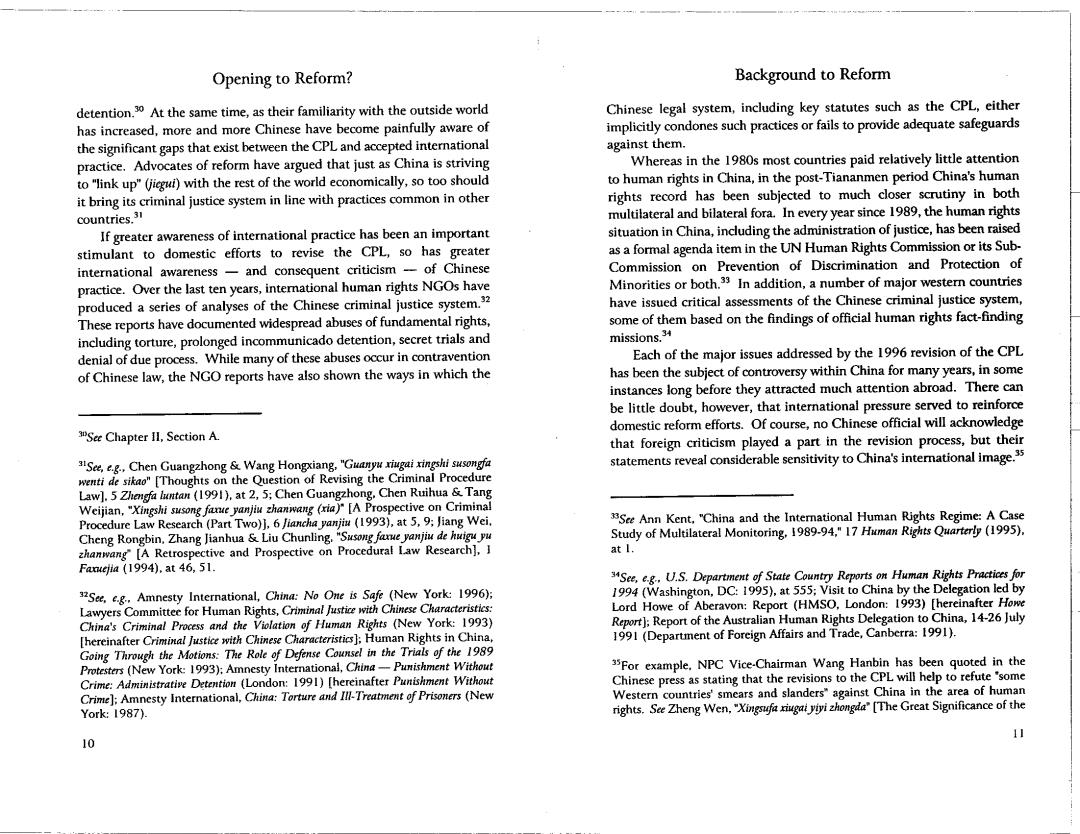
Opening to Reform? Background to Reform detention.30 At the same time,as their familiarity with the outside world Chinese legal system,including key statutes such as the CPL,either has increased,more and more Chinese have become painfully aware of implicitly condones such practices or fails to provide adequate safeguards the significant gaps that exist between the CPL and accepted international against them. practice.Advocates of reform have argued that just as China is striving Whereas in the 1980s most countries paid relatively little attention to"link up"(jicgui)with the rest of the world economically,so too should to human rights in China,in the post-Tiananmen period China's human it bring its criminal justice system in line with practices common in other rights record has been subjected to much closer scrutiny in both countries.3 multilateral and bilateral fora.In every year since 1989,the human rights If greater awareness of international practice has been an important situation in China,including the administration of justice,has been raised stimulant to domestic efforts to revise the CPL,so has greater as a formal agenda item in the UN Human Rights Commission or its Sub. international awareness -and consequent criticism-of Chinese Commission on Prevention of Discrimination and Protection of practice.Over the last ten years,interational human rights NGOs have Minorities or both.33 In addition,a number of major western countries produced a series of analyses of the Chinese criminal justice system.3 have issued critical assessments of the Chinese criminal justice system, These reports have documented widespread abuses of fundamental rights, some of them based on the findings of official human rights fact-finding including torture,prolonged incommunicado detention,secret trials and missions.3 denial of due process.While many of these abuses occur in contravention Each of the major issues addressed by the 1996 revision of the CPL of Chinese law,the NGO reports have also shown the ways in which the has been the subject of controversy within China for many years,in some instances long before they attracted much attention abroad.There can be little doubt,however,that international pressure served to reinforce domestic reform efforts.Of course,no Chinese official will acknowledge See Chapter II,Section A. that foreign criticism played a part in the revision process,but their SeegChen Guangzhong&Wang Hongxiang,"Guanyu riugai xingshi susongfa statements reveal considerable sensitivity to China's interational image. wenti de sikao"[Thoughts on the Question of Revising the Criminal Procedure Law].5 Zhengfa luntan (1991),at 2,5;Chen Guangzhong,Chen Ruihua &Tang Weijian,"Xingshi susong fare yanjiu zhanwang (ria)[A Prospective on Criminal Procedure Law Research (Part Two)).6 Jiancha yanjiu (1993),at 5,9;Jiang Wei. See Ann Kent."China and the International Human Rights Regime:A Case Cheng Rongbin.Zhang Jianhua Liu Chunling."Susong farue yanjiu de huigu yu Study of Multilateral Monitoring,1989-94,"17 Human Rights Quarterly (1995). zhanwang"[A Retrospective and Prospective on Procedural Law Research],I at I. Faxuejia (1994).at 46,51. See,e.g..U.S.Department of State Country Reports on Human Rights Practices for 3See,e.g..Amnesty International,China:No One is Safe (New York:1996): 1994(Washington,DC:1995),at 555;Visit to China by the Delegation led by Lawyers Committee for Human Rights,Criminal Justice with Chinese Characteristics: Lord Howe of Aberavon:Report (HMSO,London:1993)[hereinafter Howe China's Criminal Process and the Violation of Human Rights (New York:1993) Report]:Report of the Australian Human Rights Delegation to China,14-26 July [hereinafter Criminal Justice with Chinese Characteristics];Human Rights in China, 1991 (Department of Foreign Affairs and Trade,Canberra:1991). Going Through the Motions:The Role of Defense Counsel in the Trials of the 1989 Protesters(New York:1993):Amnesty International,China-Punishment Without 3For example.NPC Vice-Chairman Wang Hanbin has been quoted in the Crime:Administrative Detention (London:1991)[hereinafter Punishment Without Chinese press as stating that the revisions to the CPL will help to refute 'some Crime]:Amnesty International,China:Torture and Ill-Treatment of Prisoners(New Western countries'smears and slanders"against China in the area of human York:1987). rights.See Zheng Wen,"Xingsufa xiugai yiyi zhongda"[The Great Significance of the 11 10

Opening to Reform? Background to Reform Foreign criticism in the post-1989 period has influenced the domestic One of the inevitable,if largely unintended,results of this scholarship debate on criminal justice in indirect ways as well.Over the course of the is that Chinese awareness of the relevance of international human rights 1980s,China gradually became more engaged in international human to criminal justice has increased significantly.Reference to international rights diplomacy,joining the UN Human Rights Commission and standards has become a legitimate form of argumentation employed acceding to treaties such as the Convention Against Torture,the within China,particularly among legal academics,to promote greater Convention on the Elimination of All Forms of Discrimination Against respect for the rights of criminal suspects and defendants.Again,official Women and the Convention on the Rights of the Child.36 However,it explanations do not cite interational human rights standards as a factor was only in 1990,faced with the need to prepare a more coherent behind the changes to the CPL,but there is no doubt that these standards response to intemational censure,that the CCP lifted its informal ban on have come to influence the thinking of important participants in the domestic research and publications on human rights.In the years since Chinese lawmaking process. 1990,China has experienced an unprecedented upsurge in the number of conferences,articles and books devoted to introducing,analyzing and C.Drafting the Revisions to the CPL critiquing human rights theory and practice.37 The factors leading to the revision of the CPL are thus many and varied.Some reflect domestic changes,both positive and negative, Revision of the Criminal Procedure Law],Fazhi ribao,February 1,1996,at 1. stemming from economic reform.Others reflect a growing awareness of Convention Against Torture and Other Cruel,Inhuman or Degrading Treatment the gap between Chinese and international practice and a heightened or Punishment,UN General Assembly resolution 39/46,December 10,1984, sensitivity to foreign criticism.Long-standing,powerful pressures for. entered into force June 26.1987 [hereinafter Convention Against Torture); more effective crime fighting measures compete with newer,but Convention on the Elimination of All Forms of Discrimination Against Women, increasingly vocal,advocacy of improved protection of basic rights. UN General Assembly resolution 34/180,December 18,1979.entered into force September 3,1981 [hereinafter CEDAW]:Convention on the Rights of the Child, UN General Assembly resolution 44/125,November 20.1989,entered into force September 2,1990.China ratified CEDAW in 1980,the Convention Against Sciences,eds.(Social Sciences Documentary Press,Beijing:1993);Xifang renquan Torture in 1988,and the Convention on the Rights of the Child in 1991.China xeshuo [Western Theories of Human Rights].Huang Nansen Shen Zongling, is not a party to the two general human rights treaties,the International Covenant eds.(Sichuan People's Press,Chengdu:1994). on Civil and Political Rights and the International Covenant on Economic,Social, and Cultural Rights. See,e.g..Zhonghua renmin gongheguo xingshi susongfa xiugai jianyi gao yu lunzheng [Annotated Proposed Draft of the Revised Criminal Procedure Law of the People's See generally Zhou Wei,"The Study of Human Rights in the People's Republic Republic of China].Chen Guangzhong Yan Duan,eds.(China Fangzheng of China,"in Human Rights and International Relations in the Asia Pacific Region, Press,Beijing:1995)[hereinafter Annotated Proposed Draft].This annotated draft James T.H.Tang,ed.(St.Martin's Press,New York:1995),at 83.Recent of a completely revised CPL was prepared by Chinese legal academics at the publications on human rights have ranged from introductory texts to collections specific request of the NPC's Legislative Affairs Commission.See infra note 43 of international human rights treaties to analyses of Western human rights and accompanying text.It cites international human rights standards in arguing theories.See,e.g.,Pang Sen,Dangdai renquan ABC [The ABCs of Contemporary for the incorporation into the CPL of,among other things,the presumption of Human Rights](Sichuan People's Press,Chengdu:1992):Guoji renquan wenjian innocence (pp.102-03).the defendant's right to counsel at all stages of the yu guoji renquan jigou [International Human Rights Documents and International criminal process (pp.147-48).and the exclusion of evidence gathered through Human Rights Institutions],Institute of Law,Chinese Academy of Social torture(p.171). 12 13